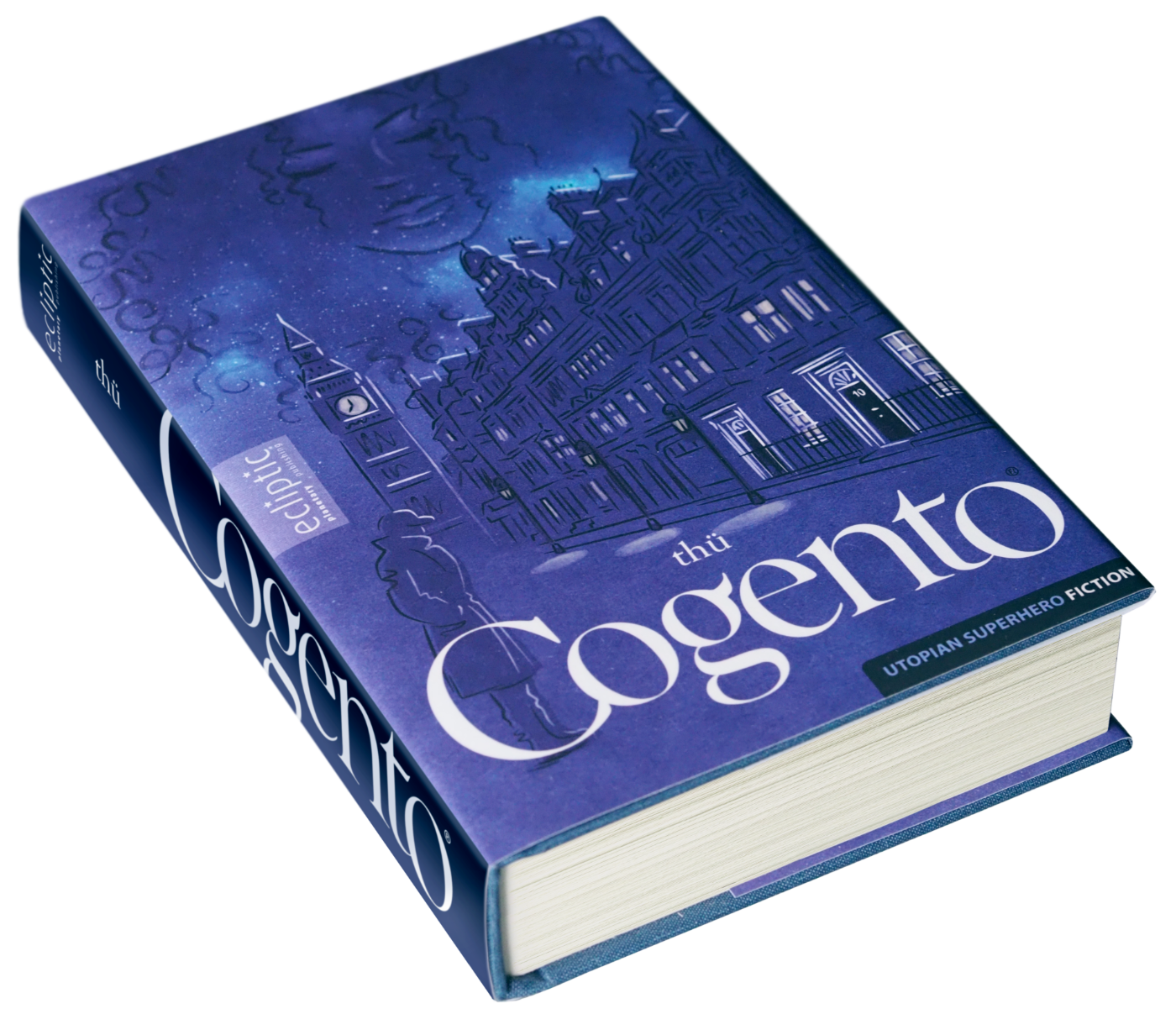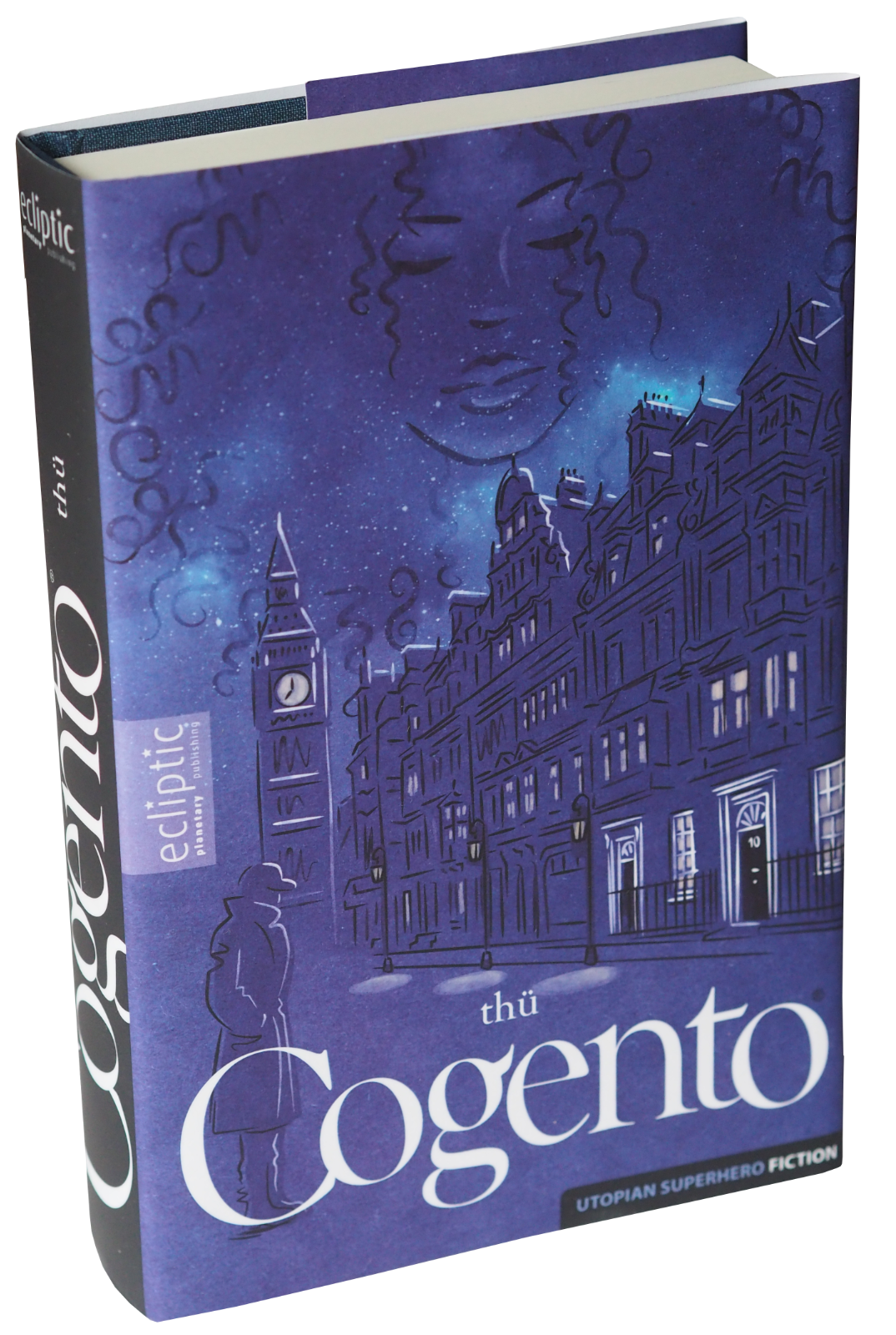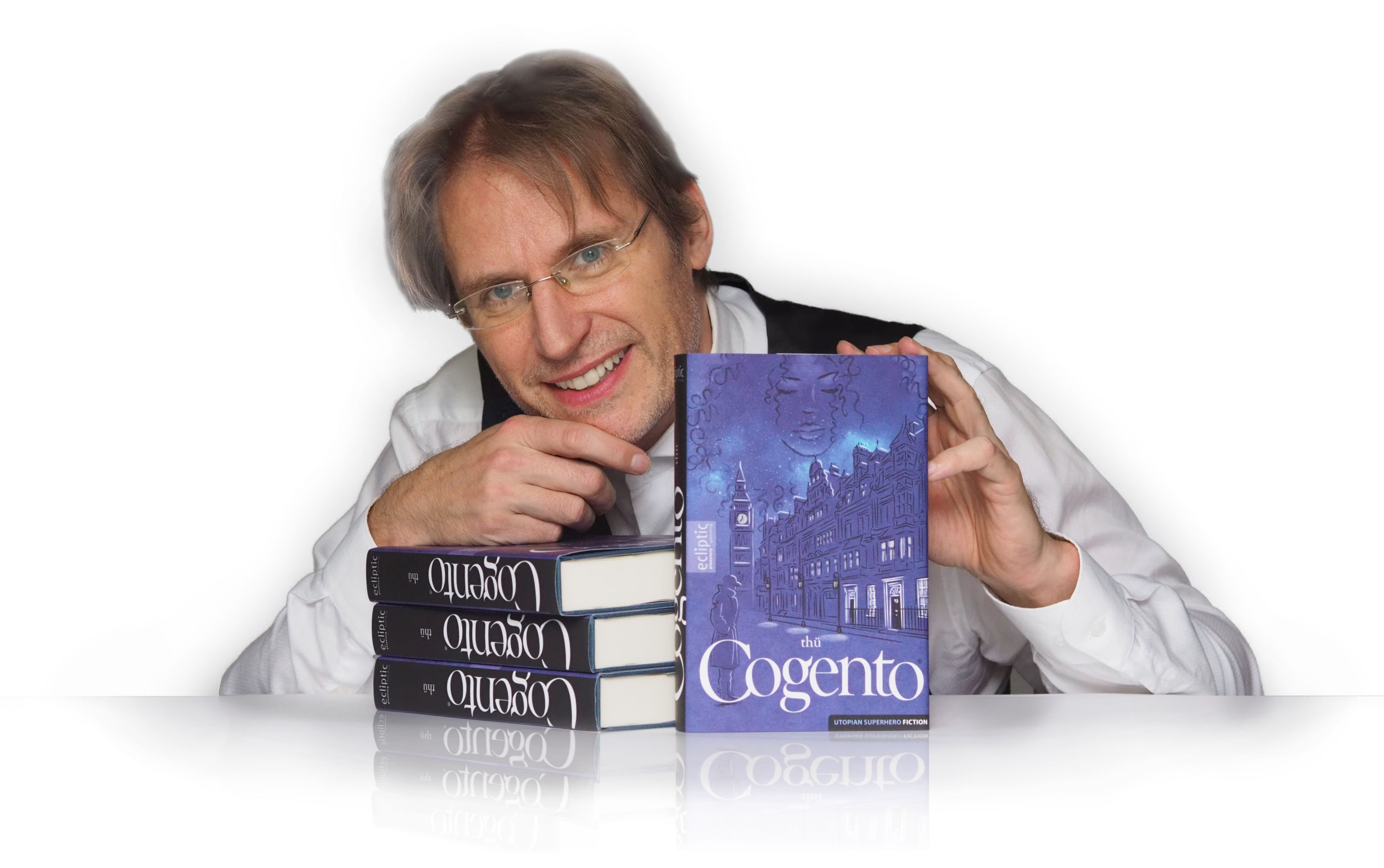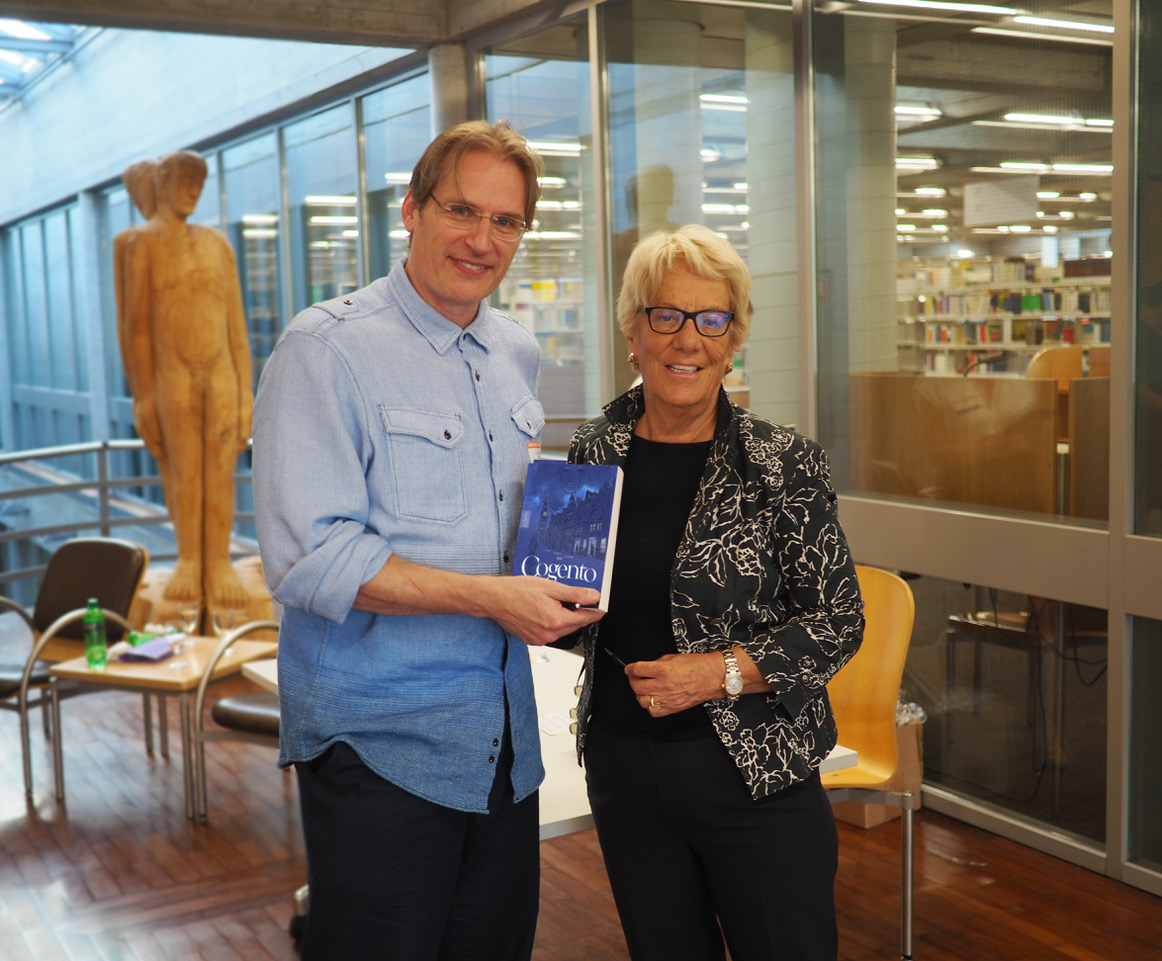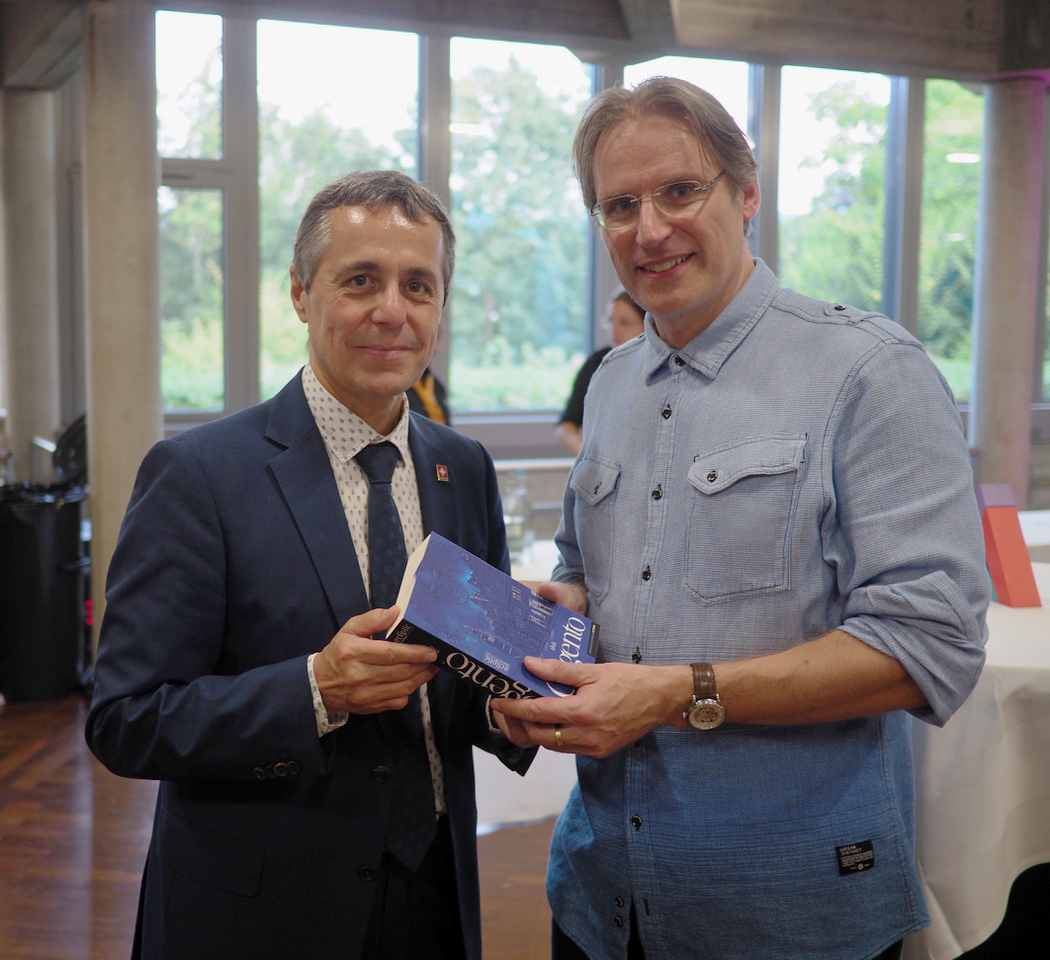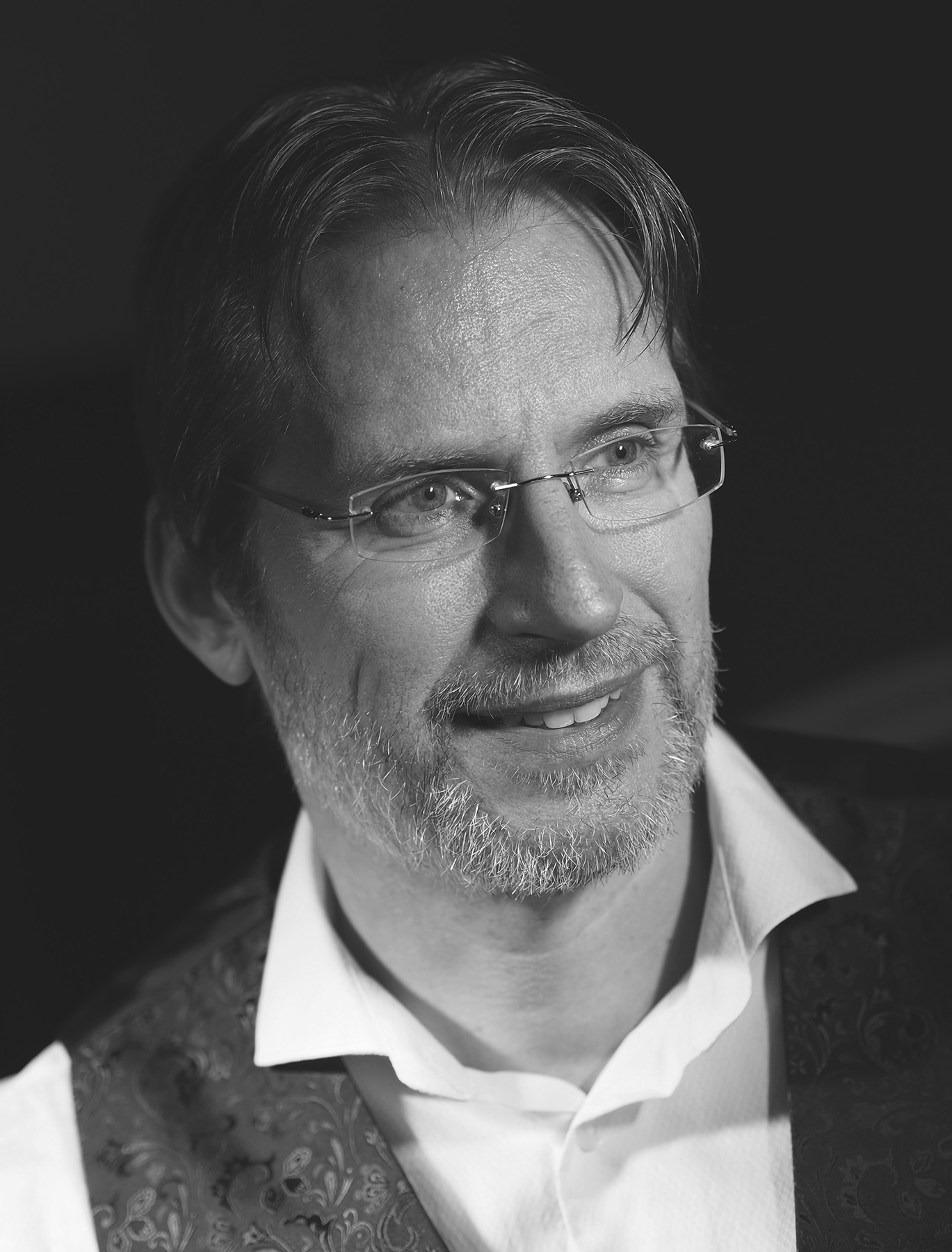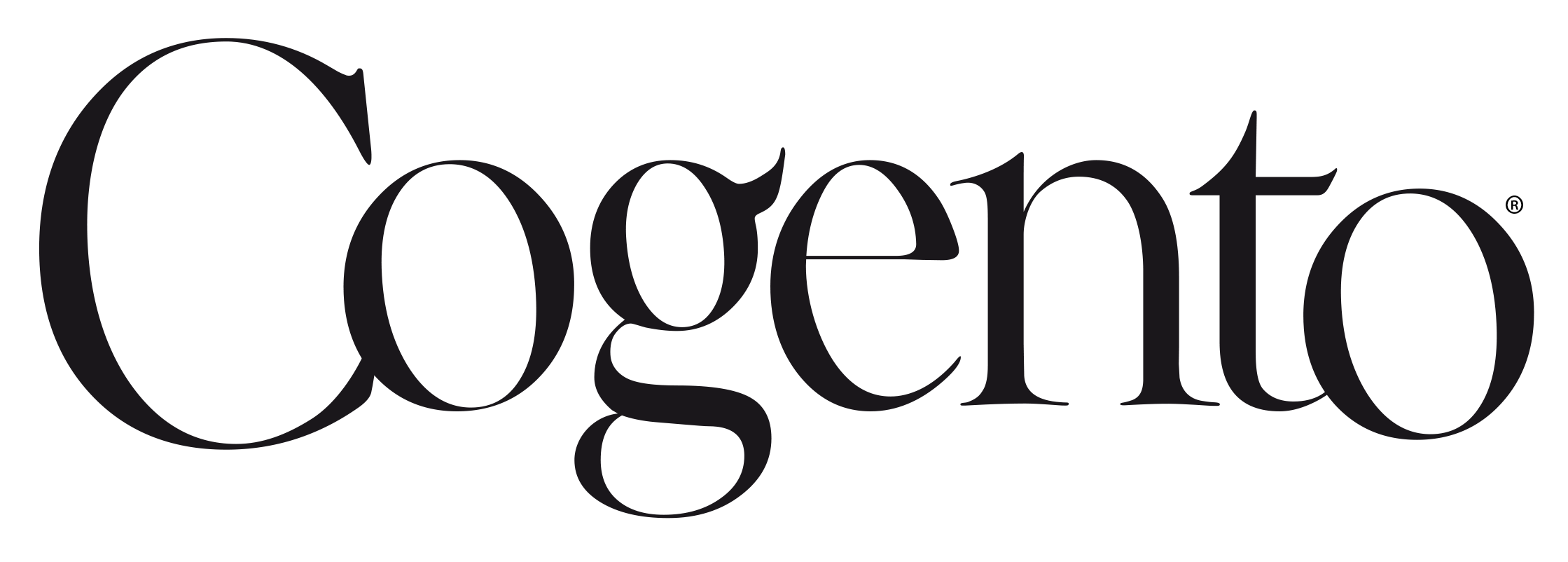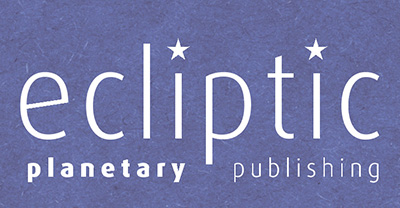
Professor Richard Dawkin's first appearance as a literary figure.
Youth novel as gateway to philosophy, world politics and climate crisis.
Exciting entertainment with added value: the adventures of a superhero, a sustainable solution to the climate crisis, world politics, philosophical questions and the famous British biologist Professor Richard Dawkins - how does it all come together? But that's only part of the story, of course. For the author Thü, it all began with the question of what a single person would have to be capable of to steer the world in the right direction. This book is the thought experiment that came out of it.
A utopian novel on 500 pages
Interview text
Picture material for use
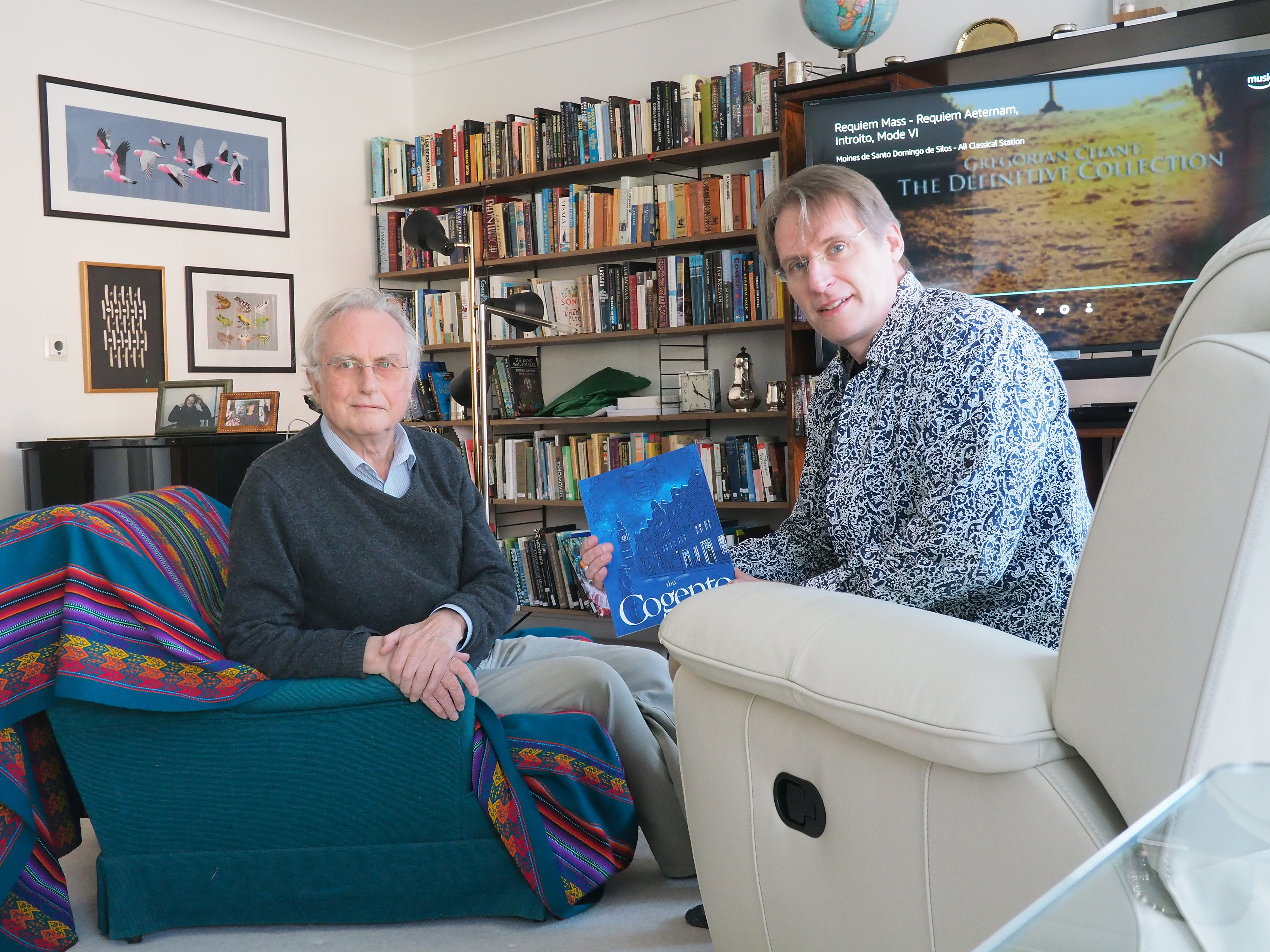
Professor Richard Dawkins with Cogento author Thü at Dawkin's home in Oxford, February 2019 - JPG image 3400x2550 Pixel, photo by ecliptic planetary publishing
Who hasn't dreamed of possessing special abilities in order to change the world? For Vaughan Macrae, this became a surprising reality when he discovered that he might have been given the most useful gift of all. But would he actually know how to use it meaningfully?
From the everyday life of an unassuming superhero who starts off on the wrong track, subsequently recognizes the full extent of his power, matures with it and finally leads a non-violent all-round blow against everything that is wrong in our world.
This humanistic adventure novel doesn't need any simple-minded super villains, because real opponents like climate change and commercial greed prove to be much more challenging than they could ever be. Cogento takes the reader into a world that differs from our own only by a single small fantasy - but nevertheless develops in a genuinely unexpected manner.
"Superhero vs. climate crisis"
"Swiss author Thü makes Richard Dawkins a novel character"
What was your motivation for writing this novel?
Having to witness how our society continues to move almost unchecked towards the abyss of a climate catastrophe has been a burden to me for decades. And to this day, very little has changed. The economy and commercial profit still have priority over a future world that’s worth living in for our descendants. I basically wrote it out of pure frustration about this current situation. I simply want to bypass the political fighting against windmills and get progress moving faster, which is now an absolute necessity. To achieve this would really require a superpower, such as that which the hero in my book has.
And what superpower would that be?
Well, it wouldn't do much good to be able to fly, would it? Or superhuman muscle power. That would not lead to anything constructive. In any case, this idea developed into a thought experiment that begins with a young man who suddenly discovers an unusual ability in himself. But I don't want to tell you too much about this yet.
Isn't superhero stuff a little ”old hat” by now?
You're probably thinking about the action-packed productions we get served from Hollywood; fights against super villains and flat plots, which are all about putting in as much violence and special effects as possible. Even my children find that boring already. I'm more interested in the interactions, problems or advantages that a superhero has in everyday life, in dealing with ordinary people.
What age is Cogento suitable for?
While writing, I had older teenagers in mind - maybe myself, too, when I was that age and first worried about the environment. It seems to me that the distractions of the virtual world nowadays leave little time to people, specially young people, to take an interest in more profound things. My book deals with the state of the world, and philosophy plays an important role in the search for solutions. I use the exciting superhero adventure as a vehicle to introduce readers to topics such as humanism, world politics and climate change. With the new awareness that has arisen in recent months thanks to Greta Thunberg, I would now say retrospectively that it fits perfectly with the young climate movement.
But philosophy? That doesn’t sound very exciting for young people.
The adventure makes up the main part of the book; how the protagonist discovers and experiments with his ability, how he alone but aimlessly tries to improve the world. But the story finally leads to a point where it becomes indispensable to think about ethics, human rights and global society if one really wants to bring about a lasting positive change. I was grateful for the input of Baroness Onora O'Neill, a philosopher who was a member of the Equality and Human Rights Commission, but who still knows how to improve the Charter of Human Rights. The hero discusses with her and with Richard Dawkins what one should or may do as a superhero. In well-known superhero comics and movies you can feel that such thoughts are necessary, but they don't leave room for them. Nevertheless, fans often discuss it passionately.
Professor Richard Dawkins is world-famous as an evolutionary biologist and atheist. What role does he play in the book?
The professor is also at the hero's side as a consultant and of course his critical attitude towards religion comes into play. But it is wrong to call him an atheist. As a logically thinking person he is an agnostic, just like me. Unlike Onora O'Neill, who has a different name in the book, Dawkins gave me permission to use his name. I told him that I wanted to try to introduce him and his concerns to an audience that wouldn't normally go for his books - by putting it all in the entertainment realm. As he was preparing one of his books for a younger audience, he was thrilled about the idea. In addition, putting a real, well-known person into a novel surprised him so much at first that he thought it had never been done before. But it's certainly the first time Dawkins has appeared as a literary character in a novel. We met in Oxford in his apartment and went through the dialogues together.
Agnostic, i.e. religion, and environmental protection - where is the connection?
I am basically a free thinker and humanist, so I do not allow myself to be restricted by ideologies and dogmas in my considerations. The organized religion is a danger for human rights, for individual freedom, especially in faith. And also politically it needs free thinkers and humanists to solve our problems; people for whom the welfare of all is most important - whereby our environment naturally comes first. But unfortunately there is also a more direct connection between religion (the conservatives) and environment (the political agenda of the conservatives against environmental measures, welfare state and individual freedom, even against education like sex education or evolution theory).
What does the solution to the climate crisis look like? And what do philosophy and human rights have to do with it?
Our world is driven by opportunism. In its present state, it is nothing more than a shop in which everyone who has the power and opportunity, freely takes what he wants - often in the absence of morality and justice. Man is greedy by nature and our extreme capitalist system promotes this inclination. Anyone who can, gets as many benefits for himself as possible. It seems a luxury to be able to stand above such temptations. Trump, Maduro, Putin, Jinping etc. - who knows if he would behave less selfishly in their place. Power corrupts. My protagonist also has to fight with that. A solution would be a system in which greed and opportunism are superfluous. Philosophical considerations within the framework of such a fictitious history can show what would be necessary for a better society and how people, politics, economy, religion and everything in general are connected.
But as a fictional novel it has no relevance for the real world.
I wouldn't say that. Science fiction has often shown that it has the potential to help shape our world. Just think of Isaac Asimov, who anticipated the use of robots and drafted laws for them, "1984" by Eric Arthur Blair, whose warning against the surveillance state is more relevant today than ever before, or the social views and technical ideas of Gene Roddenberry, who still inspire researchers today.
This story is set in England. Why not in Switzerland?
Yes, mostly in London. I've been familiar with the city since I wrote a radio play series set in Hackney. London proved to be just right this time as well, the story grew naturally into the surroundings. And it soon became clear at the beginning of the project that I would incorporate Dawkins into the plot. So it was logical that Oxford should be easy for the hero to reach. Furthermore, just as the reader likes to be kidnapped to other places, far away from his everyday life, this is also more interesting for me as a writer.
Since when are you working on the book?
I sketched the first ideas at the beginning of 2018, but the basic idea - the lonely, discreet superhero who makes world politics and moves exclusively among ordinary people - has been haunting my head for years.
Politically a lot has changed again. Did it influence the book?
With some strands of action I am almost too close to reality. So it can happen that it soon catches up with my story - which would actually be desirable. Trump is already in prison. The Brexit is blown off. France and the USA are ruled by women. The protection of the climate is the most important topic and the population demonstrates world-wide, exactly like it happens now with the new climate movement.
The sources are on the website www.cogento.org for the German version. The English version will be published in September.
"A fascinating thought experiment -
and a model for the future of mankind"
About the author
Thü was art director of Macworld magazine, illustrator and freelance editor of Macwelt. Born in 1969 and raised in Switzerland (city of Zug), educated at the Zurich University of the Arts, he later lived for a long time in South America, where he mainly worked as a musician. He now lives in Wattwil (Canton of St. Gallen) and works as a freelance illustrator, graphic artist and web designer in Zug and Wattwil. Cogento is his first great novel. Previous publications include the reference book Companies Design & Identity, the cartoon series Fermi's View, the radio plays by B.O.X. Bureau of the Unexplained, which were created in collaboration with his children, numerous computer science articles as well as reviews of recordings of classical musical works that he writes for his own Thü's Audiophile Magazine.
For further questions
reach the author Thü
directly at thu@cool-designs.ch
Tel. +41 (0)78 630 06 34


